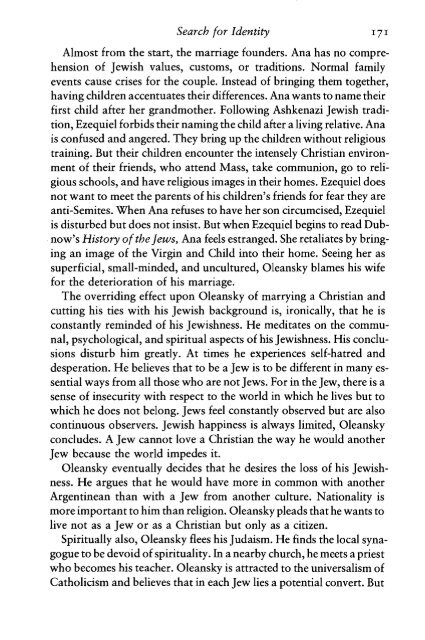Introduction - American Jewish Archives
Introduction - American Jewish Archives
Introduction - American Jewish Archives
You also want an ePaper? Increase the reach of your titles
YUMPU automatically turns print PDFs into web optimized ePapers that Google loves.
Search for Identity 171<br />
Almost from the start, the marriage founders. Ana has no compre-<br />
hension of <strong>Jewish</strong> values, customs, or traditions. Normal family<br />
events cause crises for the couple. Instead of bringing them together,<br />
having children accentuates their differences. Ana wants to name their<br />
first child after her grandmother. Following Ashkenazi <strong>Jewish</strong> tradi-<br />
tion, Ezequiel forbids their naming the child after a living relative. Ana<br />
is confused and angered. They bring up the children without religious<br />
training. But their children encounter the intensely Christian environ-<br />
ment of their friends, who attend Mass, take communion, go to reli-<br />
gious schools, and have religious images in their homes. Ezequiel does<br />
not want to meet the parents of his children's friends for fear they are<br />
anti-Semites. When Ana refuses to have her son circumcised, Ezequiel<br />
is disturbed but does not insist. But when Ezequiel begins to read Dub-<br />
now's History of theJews, Ana feels estranged. She retaliates by bring-<br />
ing an image of the Virgin and Child into their home. Seeing her as<br />
superficial, small-minded, and uncultured, Oleansky blames his wife<br />
for the deterioration of his marriage.<br />
The overriding effect upon Oleansky of marrying a Christian and<br />
cutting his ties with his <strong>Jewish</strong> background is, ironically, that he is<br />
constantly reminded of his <strong>Jewish</strong>ness. He meditates on the commu-<br />
nal, psychological, and spiritual aspects of his <strong>Jewish</strong>ness. His conclu-<br />
sions disturb him greatly. At times he experiences self-hatred and<br />
desperation. He believes that to be a Jew is to be different in many es-<br />
sential ways from all those who are not Jews. For in the Jew, there is a<br />
sense of insecurity with respect to the world in which he lives but to<br />
which he does not belong. Jews feel constantly observed but are also<br />
continuous observers. <strong>Jewish</strong> happiness is always limited, Oleansky<br />
concludes. A Jew cannot love a Christian the way he would another<br />
Jew because the world impedes it.<br />
Oleansky eventually decides that he desires the loss of his <strong>Jewish</strong>-<br />
ness. He argues that he would have more in common with another<br />
Argentinean than with a Jew from another culture. Nationality is<br />
more important to him than religion. Oleansky pleads that he wants to<br />
live not as a Jew or as a Christian but only as a citizen.<br />
Spiritually also, Oleansky flees his Judaism. He finds the local syna-<br />
gogue to be devoid of spirituality. In a nearby church, he meets a priest<br />
who becomes his teacher. Oleansky is attracted to the universalism of<br />
Catholicism and believes that in each Jew lies a potential convert. But

















